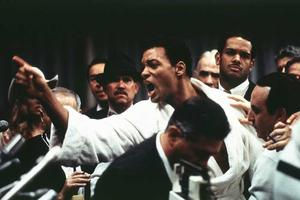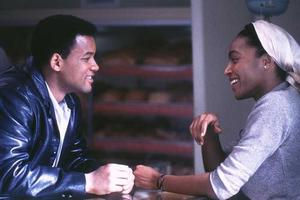Even though "Ali" quite deservedly didn't get either of its two Oscar nominations, it is still worth watching. First of all, the live boxing, filmed almost in real time from all points at once, as if from the inside of a brawl, is definitely fascinating. Secondly, it is educational: even a rabbit can understand the sport in two and a half hours of screen time and become a trained fan.
By directly editing three fateful Muhammad Ali (Will Smith) fights--with Sonny Liston, Joe Frazier and George Foreman--director Michael Mann confirms the good reputation he got for "The Clash" with Pacino and De Niro. Ali's famous "fluttering" feet in white slippers are just the beginning of the showdown. Gradually you move in that it's not really boxing with gloves, but with brains: so that it doesn't hurt when they hit you, but to hit yourself in an unprotected place. By the way, the movie doesn't say, but Mohammed Ali is one of the few boxers who never got his face smashed in. There are only two observations on this part. First, no matter how many 35 pounds Will Smith put on for the film, you can still see that he's flimsy. Matching the prototype in weight, did not take into account that he is 5 cm taller than the prototype. The extra pounds did not add to his waistline, in the frame Smith looks with each partner as if they were in different weight classes, which is especially noticeable in a fight with Foreman. He was played by real heavyweight boxer Charles Shufford, who is 15 pounds heavier than the real Muhammad Ali, and the impression is that if he kicks harder, Smith will fall apart. Secondly, as exciting as the final brawl is, for five or seven minutes the same phrase is heard from different mouths around the ring: "Get away from the ropes, get away from the ropes, get away from the ropes, get away from the ropes": Even a deaf person would grab a gun on the twenty-fifth replay, not to mention those who can hear, see and think.

In the meantime, you don't have to think about the movie. As a movie, it's a disaster. The scripts are generally beaten on the hands with a ruler. The thing is, originally based on Gregory Howard's idea, a certain Stephen Ryvel did a huge opus from the early days of the boxing legend to the present. 200 pages is probably a lot, but the way it was chopped up by Michael Mann and one Eric Roth defies description. A period of a little over ten years is taken, and clearly for reasons of political economy. Commodity-money-commodity touch, that is, a victory over Liston, a loss to Frazier, and a world victory over Foreman. Both the Olympics "before that" and the much more important rematch with Frazier in Manila "after that" fell out. A lot of things fell out, which, however, might even have been good under certain conditions - for example, if what was left had a rigid composition and an independent meaning that was more important than the facts in someone's biography. Alas, there was no meaning between battles.
White Mann, for the sake of political correctness, gave a broad picture of the Negro movement. There's Martin Luther King, Malcolm X, and a bunch of Islamists, all without explanation. As you sort it out, boxing somehow recedes into the background. Why the polyeconomic scheme then? Well, okay, let's say Ali's main focus is the fiery struggle for freedom for Afro-Americans, and the film is about our black brothers. But the "big picture" is also crushed by extraneous circumstances - the story with the army and the trial, which also drags on for quite a while. Why would a film about black brothers need to fight for peace? Besides, Ali is not a pacifist at all and has suffered most in life for what is missing in the film - his terrible stubbornness with the American Boxing Association.

Finally, the "personal life" is lightly interspersed, most of all the beginning of family life with his first wife, a smart and beautiful woman, and a bit of adultery at the drop of a hat, for no particular reason. Only the final credits tell us that Ali soon divorced his second wife (he had just met her in the film, and she was decidedly no different from the first) and now, sick with Parkinson's, lives in a third happy marriage. In reality, of course, it wasn't like that at all. A chronic womanizer, Ali also gave birth to eight children (one daughter is glimpsed in the movie), and his second wife picked him up by accident, being a patented bitch. But the problem, again, is that there's no special "male" meaning behind the women in the movie. Just petty interjections.

And so the result is a wild Negro-political skew, with occasional flashbacks to some protagonist and interruptions in the form of courts and cupids, trimmed on both sides to the size of ten years. The character of the protagonist--even if fictional, let alone real--does not add up decisively from these individual cubes. None of the many authors have gotten to the essence of the boxing legend. The legend does not fit into any kind of political correctness. It would have been better if there had been only fights and the credits in between. In the final credits, however, how well the credits went: The Man was forgotten.
This article was sponsored by Cameron Kano
Comments